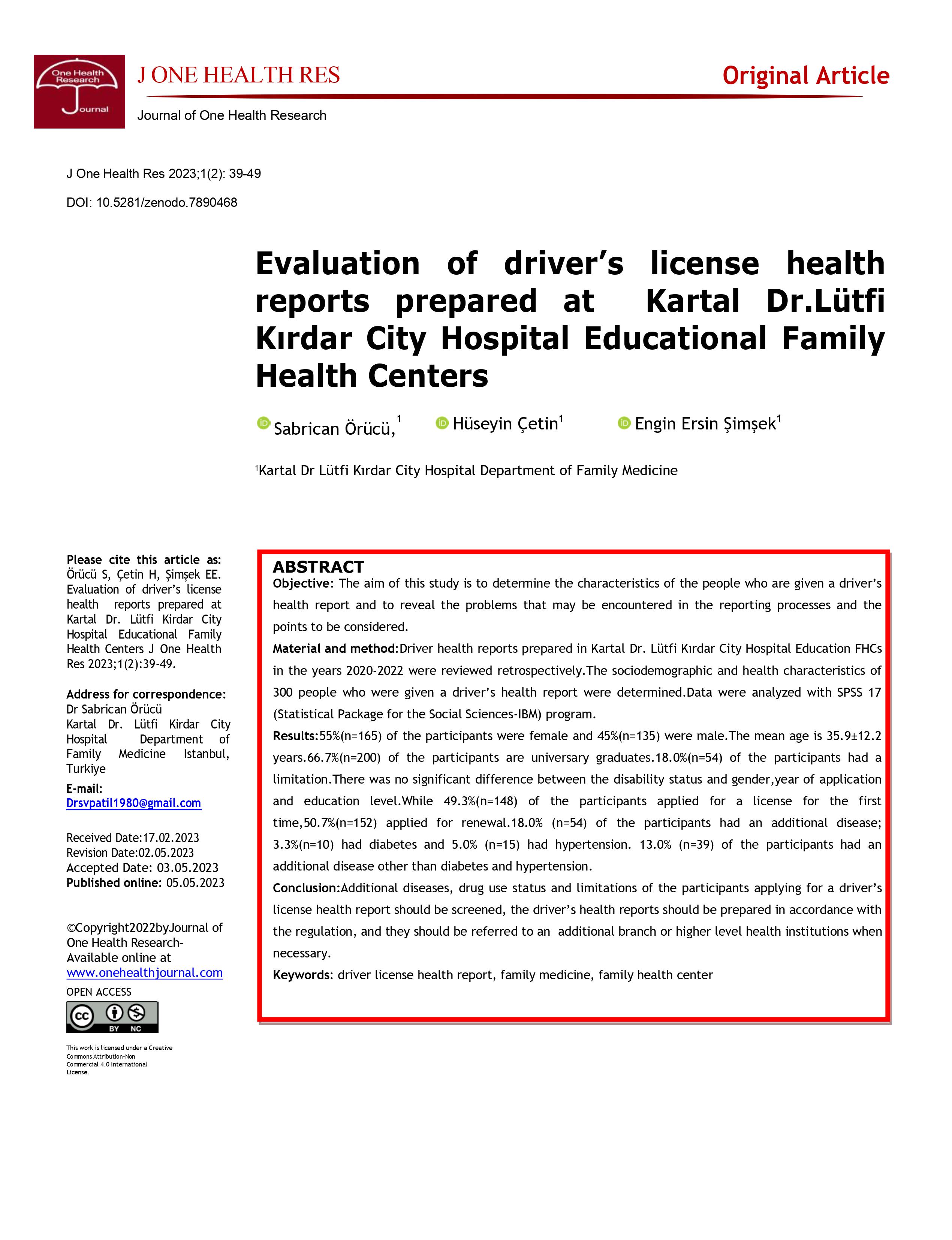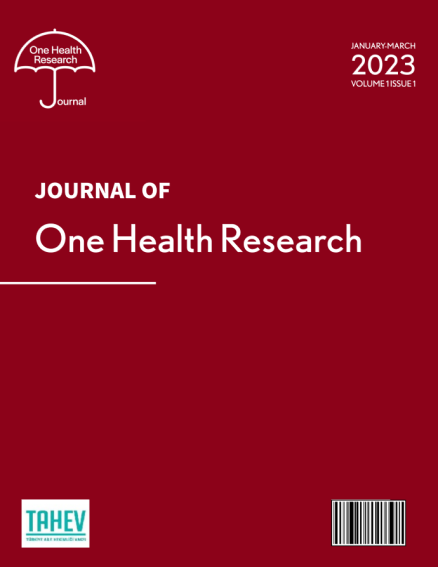Evaluation of driver’s license health reports prepared at Kartal Dr.Lütfi Kırdar City Hospital Educational Family Health Centers
Evaluation of driver’s license health reports
DOI:
https://doi.org/10.5281/zenodo.7890468Keywords:
driver's licence health report, family medicine, family health centerAbstract
Objective: With the ‘’Regulation on the health conditions and examinations to be sought in driver candidates and drivers’’, which was published in the Official Gazette 26.09.2006 and numbered 26301, doctors and specialist doctors working in Family Health Centers (FHC) were authorized to issue driving licences health report (DLHR). While issuing this document, it is necessary tocomply with the health conditions and inspection principles specified in the regulation. Health reports have an important place among the daily workload of physicians working in Family Health Centers (FHCs). The aim of this study is to determine the characteristics of the people who are given a driver’s health report and to reveal the problems that may be encountered in the reporting processes and the points to be considered.
Material and method: Driver health reports prepared in Kartal Dr.Lütfi Kırdar City Hospital E-FHCs in the years 2020-2022 were reviewed retrospectively. The sociodemographic and health characteristics of 300 people who were given a driver’s health report were determined. Data were analyzed with SPSS 17 (Statistical Package for the Social Sciences - IBM®) program.
Results: 55% (n=165) of the participants were female and 45%(n=135) were male. The mean age is 35.9±12.2 years.66.7%(n=200) of the participants are universary graduates. 18.0%(n=54) of the participants had a limitation. There was no significant difference between the disability status and gender, year of application and education level. While 49.3%(n=148) of the participants applied for a license for the first time,50.7%(n=152) applied for renewal.18.0% (n=54) of the participants had an additional disease; 3.3%(n=10) had diabetes and 5.0% (n=15) had hypertension. 13.0% (n=39) of the participants had an additional disease other than diabetes and hypertension.
Conclusion: Additional diseases, drug use status and limitations of the participants applying for a driver’s license health report should be screened, the driver’s health reports should be prepared in accordance with the regulation, and they should be referred to an additional branch or higher level health institutions when necessary.
References
Sürücü Adayları Ve Sürücülerde Aranacak Sağlık Şartları İle Muayenelerine Dair Yönetmelik, Resmî Gazete Tarih ve Sayısı: 26.09.2006 - 26301
Sümer N. Bir eğitim hastanesine başvuran sürücü ve sürücü adaylarının doldurdukları beyan formlarındaki bilgiler ile muayene bulgularının karşılaştırılması (Tıpta Uzmanlık Tezi). SBÜ Antalya SUAM Aile Hekimliği Kliniği, Antalya 2019
Kır MZ, Yavuz MS, Uluçay T, Zeyfeoğlu Y, Kahraman İ, Tatar G. Özürlü sağlık kurulunda değerlendirilen trafik kazası olguları. CBU-SBED 2015;2(4):106-109
Şahin M, Öztürk Ö, Çoksevim M. Kardiyovasküler hastalıklar ve taşıt sürücülüğü: Türk Kardiyoloji Derneği Görüşü. Turk Kardiyol Dern Ars 2016;44(8):706-714
Sungur İ, Akdur R, Piyal B. Türkiye’deki Trafik Kazalarının Analizi. Ankara Med J 2014;14(3):114–124
Delice M. Kadın Sürücülerin Trafik Kazaları Üzerindeki Etkilerinin İncelenmesi. Atatürk Üniversitesi Edebiyat Fakültesi Sosyal Bilimler Dergisi 2012;12(49):63-87
Balkan Bilgin H. Sürücülerin risk algısı, kişilik ve trafik güvenliği unsurlarına karşı tutumlarının riskli sürüş davranışları-kaza riski üzerine etkisi (Tıpta Uzmanlık Tezi). Başkent Üniversitesi Adli Tıp Anabilim Dalı, Ankara 2016
Kurşun H. Antalya Eğitim ve Araştırma Hastanesi Aile Hekimliği Polikliniğine başvuran yaşlı bireylerin sağlık durumu ve sürücü özelliklerinin değerlendirilmesi (Tıpta Uzmanlık Tezi). SBÜ Antalya SUAM Aile Hekimliği Kliniği, Antalya 2015
Ivers RQ, Mitchell P, Cumming RG. Sensory impairment and driving: The Blue Mountains Eye Study. Am J Public Health 1999;89(1):85-87.
Yazıcı S, Vural R. İleri Yaşta Güvenli Taşıt Kullanımı. Akdeniz Tıp Dergisi 2015;1(1):5-11
Aran OT et.al. Yaşlı sürücülerin araba kullanma becerilerinin değerlendirilmesi. Ergoterapi ve Rehabilitasyon Dergisi 2019;7(1):65-70
Diker J, Etiler N, Yıldız M, Şeref B. Altmış beş yaş üzerindeki kişilerde bilişsel durumun günlük yaşam aktiviteleri, yaşam kalitesi ve demografik değişkenlerle ilişkisi: Bir alan çalışması. Anadolu Psikiyatri Dergisi 2001;2(2):79-86
Bernardelli G. et.al. Socio-demographic characteristics and cognitive performance in oldest old subjects asking for driving license renewal. BMC Geriatrics 2020;20:241
Horikawa E, Morizono R, Koga A, Horie J. Elderly driving behavior and cognitive functions: Analysis of License Renewal Course Data. IATSS research 2009;33(1):18-26
Jovanovi J, Luki S. The cardio vascular disorders and drivers ability. Medicine and Biology 1997;4(1):51-56
Erim BR, Yumru M, Sercan M, Özen M, Abatan E. Psikiyatrik hastalık ve tedaviler sürücülük becerisini etkiler mi? Klinik Psikiyatri 2015;18:82-89
Cushman LA, Good RG, States JD, Psychiatric disorders and motor vehicle accidents. Psychological reports 1990;67(2):483-489
Pek A, Pınarcı M. Alkol ve bağımlılık yapıcı madde kullanımının trafik güvenliğine etkisi. Turkish Journal of Police Studies 2010;12(4):1-17
Aktaş A, Döğer R, Akgür SA. Profesyonel Araç Sürücülerinde Sürücü Davranışları Ve Becerileri İle Alkol, Madde Ve İlaç Kullanımının Değerlendirilmesi. Adli Tıp Bülteni 2019;24(2):100-107
Pascali JP, Vaiano F, Palumbo D, Ronchi FU, Mari F, Bertol E. Psychotropic substance abuse and fitness to hold a driving license in Italy. Traffic injury prevention 2019;20(3):244-248
Özdilek B, Uç E. Driving in Parkinson’s disease. Turkish Journal of Neurology 2014;20(3):64-71
Papageorgiou S. G, Beratis IN, Kontaxopoulou D, Fragkiadaki S, Pavlou D, Yannis G. Does the diagnosis of Alzheimer’s disease imply immediate revocation of a driving license? International journal of clinical neurosciences and mental health 2016;3(Suppl 1):S02
Topçuoğlu ÖB. Türkiye’de epilepsi ve araç kullanımı. New/Yeni Symposium Journal 2011;49(4):237-239
Taylor J, Chadwick D, Johnson T. Risk of accidents in drivers with epilepsy. Journal of Neurology, Neurosurgery, and Psychiatry 1996;60:621-627
Fırat H. Sürücü Belgesi Alma Kriterlerinde Uyku. Journal of Turkish Sleep Medicine 2016;3(1):7-7
Fattouch J. et.al. Epilepsy unawareness of seizures and driving license: the potential role of 24-hour ambulatory EEG in defining seizure freedom. Epilepsy&Behavior 2012;25(1):32-35
Kurt A, Öktem Ç, Acer KA, Kocamış Ö, Taşdemir S. Necessity of periodic ophthalmological examinations in binocular B class driving licence holders over 50 years of age. Turkish Journal of Ophtalmology 2016;46(2):73-76
Gislason T, Tomasson K, Reynisdottır H, Björnsson JK, Kristbjarnarson H. Medical risk factors amongst drivers in single-car accidents. Journal of Internal Medicine 1997;241:213-219
Findley LJ, Unverzagt ME, Suratt PM. Automobile accidents involving patients with obstructive sleep apnea. AmericanRewiew of Respiratory Disease 1988;138(2):337-340
Waller PF, Stewart JR, Hansen AR The Potentiating Effects of Alcohol on Driver Injury JAMA 1986;256(11):1461-1466
Prasad RS, Hunter J, Hanley J. Driving experiences of disabled drivers. Clinical Rehabilitation 2006;20:445-450
Sümer N. Trafik kazalarında sosyal psikolojik etmenler: Sürücü davranışları, becerileri ve sosyal politik çevre. Türk Psikoloji Yazıları 2002;5(9-10):1-36
Honkasalo M, Elonheimo O, Sane T. Many diabetic patients with recurrent severe hypoglycemias hold a valid driving license. A community-based study in insulin-treated patients with diabetes. Traffic injury prevention 2010;11(3):258-262
Brož J. et.al. Fear of driving license with drawal in patients with insulin-treated diabetes mellitus negatively influences their decision to report severe hypoglycemic events tophysicians. Patient Preference And Adherence 2015;9:1367-1370
Martin FS, Estevez MAQ. Prevention of traffic accidents: The assessment of perceptual-motor alterations before obtaining a driving license. A longitudinal study of the first years of driving. Brain Injury 2005;19(3):249-259
Hansotia P, Broste SK. The effect of epilepsy or diabetes mellitus on the risk of automobile accidents. New England Journal of Medicine 1991;324(1):22-26

Downloads
Published
How to Cite
Issue
Section
License
Copyright (c) 2023 Journal of One Health Research

This work is licensed under a Creative Commons Attribution 4.0 International License.



